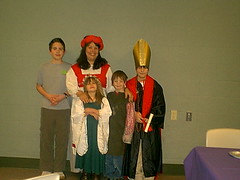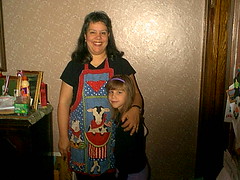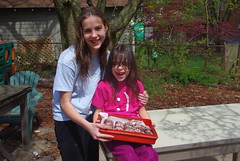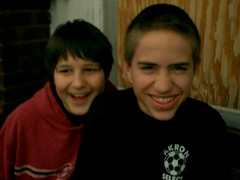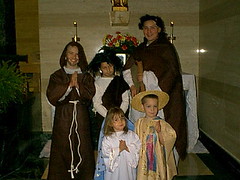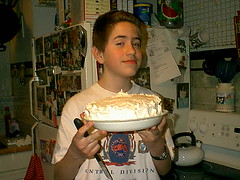First published in 2012 and then 2014, surprisingly with a bit of controversy! In honor of our 20th Year of homeschooling with the 2015/2016 school year, I think it’s worth revisiting.
I totally understand skepticism when it comes to homeschooling – because 20 years or so I was skeptical too. In fact, I had never even heard of homeschooling back in 1995, and the first time I did hear about it I thought it was absolutely ridiculous! Who in their right mind would want to keep their school aged child home with them and attempt to school them!? Not me!! I was looking forward to sticking Calvin’s little butt in school and Sam in a friendly day care so that I could go to a nice job, wear grown up clothes, and even take some classes. It was going to be time for ME.
And then a curious thing happened. After not hearing about homeschooling EVER, I started hearing about it all the time. I would turn on the radio or the television and there would be something about homeschooling. At the doctor’s office I picked up a magazine and there was an article on homeschooling. And slowly I started to hear and understand the “pro”side for homeschooling. What turned the table for me was a trip to my pediatrician’s office.
Calvin was a mid-summer a baby. He was also a rambunctious little boy, so as the September of his 5th year got closer I was more and more apprehensive about sending him to school. I decided to ask my pediatrician about it. So off we went for a check up and after examining my boy thoroughly the pediatrician pronounced him very fit, and “all boy.” He also suggested that I might want to wait a year so that he would have a chance to mature a bit before attending school, but then he added, “But I’m a homeschooler so my opinion on that is a little out there.”
I was shocked. All those years with my doc and I didn’t even know he was a homeschooler. When I told him I had been hearing a lot about home schooling, he went back to his desk and brought me all kinds of information about it. As I read more and more about it, my heart and my mind opened to the possibility. I heard about an upcoming homeschool conference and I made plans to go. I thought it would be a few people gathering in some one’s back yard or something like that. Instead it was in a massive convention center and there were hundreds of people there. I was absolutely stunned. The speakers there were encouraging and inspiring and I left there fully determined to go home and teach my son, myself.
The next big obstacle, was telling my mother, who had taught in the public schools for 29 years, that her grandchildren were going to be taught at home! I needn’t have worried – she supported me whole heartedly and in fact, was Sam’s exclusive teacher until 9th grade.
Five more kids and more than a decade’s worth of homeschooling later, we have persevered through births, deaths, sickness, and poverty. A lot of it has been fun, some of it was really hard, but all of it was worth it. So after all that, here is why I would recommend homeschooling.
1. Homeschooling is good for the family. It just is. All that time together makes kids grow a more deeper love and respect for their parents, and I would say the reverse is true as well. These shared experiences of field trips and lessons, laughing and learning together make strong bonds that will stand the test of time. Homeschooling also gives families more of the gift of time to spend together. Childhood is fleeting and homeschooling just helps to increase the number of memorable and special moments between parents and children.
Update: Although my oldest is now 8 hours away, he calls home regularly and his new wife called me on my birthday to chat. I see my third son almost daily as he drops off his daughter for babysitting, and my second son will come by for family dinners, celebrations, or to let me know any of his good news! In fact, the one thing I have noticed about my adult children, is that even if I don’t hear from them in a while, they seek me out to let me know when they’ve achieved something big – whether it was getting a new job or passing the GED, letting me know was important to them. I really appreciate that.
2. Schooling adapts to the family, not the otherway around. If the family can only take time off in September when Dad gets some free time, it’s not a problem. They can just take off time to be a family and make up the school work some other time. If Dad is off on Mondays, school can happen on Saturday instead. If the basement floods and there are no clean clothes- the pressure to get kids to school on time is off. Birth of a baby, death of a grandparent, weeks of strep throat – all of these are times when homeschooling can be shortened, lessened or postponed to a better time for the sake of the family.
I have heard many moms say, “I don’t know how you can homeschool,” but I have often felt the opposite way, “I don’t know how you can put your kids in regular school!” Getting up early every day, cutting baby’s nap short to go pick up the kids from school, packing lunches, helping with homework – all of that sounds harder to me than homeschooling!
3. The relationship with siblings. When I was growing up my sister and I didn’t see much of each other during the actual school day. The school environment encouraged her to have her friends, and me to have mine and many times those outside friendships took precedence over siblings. I’m happy to say that we are good friends now in middle age, but it took us some time to get there!
In homeschool siblings become great friends to each other. Two of my older teens are each other’s best friends – they even formed a band together because they actually like each other’s company. Likewise my younger teens are also friends and even my girls, who are six years apart, find ways to play together. Sure they still fight and fuss with each other, but they have deep and important relationships with each other that I sure didn’t see with siblings when I was a teenager.
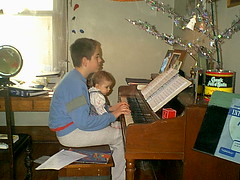
All of his brothers and sisters (and niece!) were in the wedding and we made even more new memories together.
Last year and this, we are also homeschooling with our grandbaby around in the afternoons, and we love having her as well.
4. Living the faith! In the home children can be surrounded by signs of the faith!! Crosses, rosaries, statuary and pictures… items that would never be allowed in a public school classroom are common place in the homeschool. They just change the atmosphere and make it a special place to live and learn. Holy days, feast days and the church year become a part of family life – and not just something to be read about in a book during a religion class.
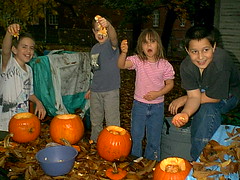
Update: My young-20-somethings attend church occasionally and are mostly trying to figure things out for themselves. They are asking questions and are open to discussions about the faith. But my oldest son has been attending mass regularly and even made a point of going to confession before his wedding, which was also held in a Catholic Church! I anticipate that as they grow older, they will find their way back to church, just like Mr. Pete and I did.
5. Homeschooling allows for a customized education that fits each child’s learning style. That rambunctious little boy doesn’t have to sit still for five or more hours a day! He can make a map out of clay, or go outside and pretend he’s General Custer or take an instant camera to the park and see how many pictures of birds and insects he can get and then come home and try to identify them! Kids can learn in a way that is best for them – which might be sitting quietly at a desk reading a book – but it might also mean listening to tapes, or working on a computer or going outside. The world is the homeschooler’s classroom and there are many options.
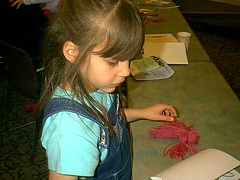
6. Slow learners aren’t stigmatized and gifted learners aren’t told to slow down. Kids can go at their own pace without artificial deadlines. I’ve had two kids that didn’t learn to read until very late in elementary school. I can’t imagine how being one of the “slow kids” in school would have damaged them. But since we handled it at home my one “slow reader” now reads books for pleasure and is gainfully employed, and my daughter is a very accomplished artist.
Update: Well, one of the criticisms I took last year was that “you’ve freely admitted the at least one of your children cannot read to grade level and is in fact, behind,”
This was wrong- I freely admitted that TWO of my children, at one time or another, could not read at grade level and was in fact, behind. My first child with a reading problem is now gainfully employed as a paramedic. He managed to read all of his course work and pass all of the necessary tests, so I’m going to count that one as a success.
My daughter is still behind but is catching up. Despite her difficulties she pulled an A in biology and an A in geometry last year – grading was done by a teacher I had hired to handle those subjects with her for me. In the meantime, with recorded books, and help with vocabulary she has problems with, she is able to work at her grade level in other subjects.
I believe in the public schools they call this an IEP.
7. Learning is real – it’s done because it is interesting and because the child wants to learn the subject, not to pass a standardized test.
Update: Which is not to say we CAN’T pass standardized tests. My oldest has taken plenty of tests to get where he is today. My second son passed the CLEP exams in Biology, College Math and American History, my third son passed the GED on his own, and son #4 has passed a CLEP in American History and did okay on the ACT.
8. Homeschooling provides real socialization. It is not age segregated and peer dependent. In the real world we aren’t all separated by our birth year!!
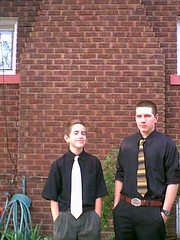
9. Parents can regulate the curriculum and the resources used to teach the curriculum.
Update: Last year and this year, I have used some pretty advanced things for Noah to use on his college prep track, and more high school level things for my daughter. I’m still trying to give her a college prep exposure just in case she decides she would like to go to college, but if she decides to work instead, I’d like her to be prepared for that as well. So I’m basically designing the curriculum for each of my high school students around their abilities and interests, while keeping state standards and future needs in mind.
10. Family values aren’t undermined by the school or the teachers.
Update: Yea, I had a grandchild before I had a daughter-in-law. We’re also not the only homeschool family this has happened to. It’s not easy being a parent these days. I’ve blogged on that before too.
We can be confident that they will leave home and that they will all make poor choices and some of them will make very poor choices. However, we can cling to the truth that as we wait for God to work in the hearts of these children in whom we’ve invested so much, it is we who can rely on the grace of all those years of doing.
It is we who soak up the encouragement of the noble, true, right and lovely things we taught them and cling to the faith that the seeds were planted and one day the fruit of potential we know is growing will ripen on this tree we tended lovingly when it was just a vulnerable sapling. We can reflect on the years in our homes and know that that those children–despite their poor choices in the moment–do know who Christ really is. They have walked with Him in the lives of their families. They just don’t really think they need Him right now. But soon enough, I think, they will. Elizabeth Foss
Special Bonuses!
(You have ) ensured that none of your children will ever become engineers or doctors or any other STEM fields.
None of my kids (so far) have been interested in STEM fields, although my oldest is a paramedic. Their interests, on a whole, have been more towards the liberal arts. However, we have had several engineers and nurses from our homeschool group alumni, and many homeschoolers gravitate towards those fields.
I can’t help but wonder if you’re homeschooling for a better education or if you are trying to filter a world that you feel unqualified to speak about?
Two words – tutors, and co-op! When I feel unqualified, I get help, OR I buckle down and try to learn the material myself! But so far I have been blessed to have some great tutors in math and science and the Bravewriter program has been awesome for writing skills!
focus too much on what you know, that being religion and history to the detriment of vital subjects of biology, calculus, trigonometry etc
We did biology last year in co-op. Noah is getting ready to take the CLEP in biology and Sam did pass the CLEP in biology. Sam took pre-calc as a senior and I think Noah will this year as well. Some trig was handled in geometry.
BTW- I was AWESOME in biology in college – particularly anatomy and physiology!
See my Homeschool Page above for more articles and resources.

